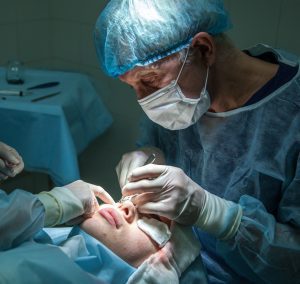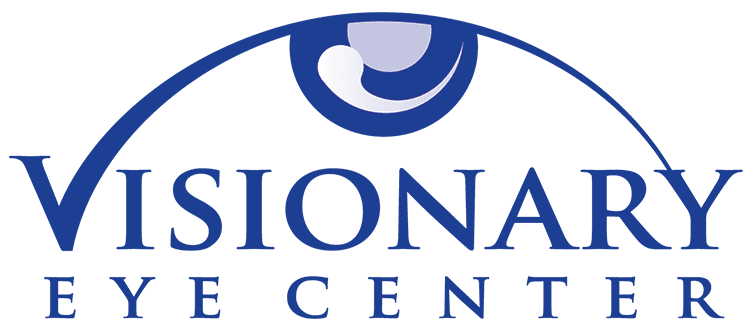What Is LASIK?
LASIK eye surgery can be used to achieve 20/20 vision or better, as an alternative to eyeglasses or contact lenses. This is a type of laser eye surgery, and it works best for patients who have a moderate degree of refractive error and no unusual vision problems.
LASIK surgery involves first numbing the eyes with drops and taking a mild sedative medication, then the surgeon uses a special type of cutting laser to precisely alter the curvature of your corneas. As the laser beam pulses, a tiny amount of corneal tissue is removed to allow the surgeon to flatten the curve of your corneas or make it steeper to correct your vision.
There are multiple variations of LASIK surgery, but the most common procedure involves the surgeon creating a flap in the cornea and raising it up before reshaping it. The flap is then placed back into its original position, and vision recovery usually only takes 1 to 2 days. Sometimes only a very thin flap is raised or no flap is raised or even used at all; it really depends on your individual circumstances and preferences.
Common Benefits Of LASIK
LASIK surgery has many benefits when it comes to correcting your vision almost immediately, is long-lasting, and can continually be improved. Here is a summary of the top benefits of LASIK that will play a role in your decision:
- LASIK surgery is tailored to correct your vision problems. Research has found that around 96% of patients will have their desired vision after their LASIK surgery, and future enhancements can make this number even better.
- There is very little pain during the LASIK surgery due to the numbing drops that are used.
- Vision is corrected nearly immediately or the day after the LASIK procedure.
- No stitches or bandages are needed after LASIK.
- Adjustments can be made years after your initial LASIK surgery to further correct vision if it changes while you age, which it most likely will.
- After their LASIK procedure, most patients have a significant reduction in the need for glasses or contact lenses, and many patients no longer need them at all. So if you are tired of glasses or contacts, LASIK may be a good substitute for you.
Risks / Complications Of LASIK
Your current and past eye health, and any disorders that run in your family will play an important role in whether or not it’s a good idea to get LASIK surgery, which your eye surgeon will ask you about. The following are some complications that could result in poor outcomes after the LASIK surgery, along with side effects of the surgery, that can help you to weigh if LASIK is the best option for you.
Pre-existing eye health conditions that can cause complications with LASIK:
- An eye disease that results in progressive deterioration of your vision and thinning of your cornea, such as keratoconus, especially if it runs in your family.
- Inflammation and infections that affect the eye.
- Eye injuries or eyelid disorders.
- Dry eyes, as LASIK may make this worse, causing a temporary decrease in tear production.
- Large pupils, especially in dim light, could result in debilitating symptoms after LASIK surgery, including seeing glare, shapes and reflections off of bright lights, or double vision.
- Glaucoma, or abnormally high pressure in the eye.
- Cataracts, or clouding of the lens of the eye, leading to blurry vision. LASIK is not designed to correct the vision problems caused by cataracts and cataracts will most likely need their own surgery to be removed at some point. During this procedure, vision issues that LASIK typically corrects can be done all in one, making the need for LASIK obsolete.
Possible Side Effects and Complications:
- Undercorrection: Sometimes too little tissue will be removed by the laser, leading to an under-correction. This happens most commonly for nearsighted patients and may mean they will need an enhancement within a year to remove more tissue.
- Overcorrection: The opposite of under-corrections, these may be more difficult to fix.
- Astigmatism: This condition happens when the cornea curves or flattens unevenly, causing overall blurry vision whether near or far. After LASIK surgery, astigmatism can be caused by uneven tissue removal, which could, unfortunately, mean additional surgery, glasses, or contact lenses.
- Corneal Ectasia: This is an abnormal thinning of the cornea, the transparent tissue covering the front of the eye to help focus the light that enters. This problem can lead to an irregular, bulging appearance of the eye, and symptoms can include some of the same side effects of LASIK surgery itself.
- Flap problems: folding back or removing the corneal flap during surgery can cause infection and excess tears, and the outermost tissue layer called the epithelium, may grow back abnormally underneath the flap during the healing process.
- Vision loss or changes: This is a rare side effect of surgical complications, however, you may experience some loss of vision or not be able to see as sharply or clearly as before.
The Ideal Candidate for LASIK Surgery
 When considering LASIK surgery, there are several personal health conditions and medications you take that may not make you a good candidate, so your surgeon will review and assess all of these to determine if the procedure is right for you. The following are some factors that would NOT make you a good candidate for LASIK; if you don’t have these, you are more likely to move forward with the surgery, just always check with your surgeon first:
When considering LASIK surgery, there are several personal health conditions and medications you take that may not make you a good candidate, so your surgeon will review and assess all of these to determine if the procedure is right for you. The following are some factors that would NOT make you a good candidate for LASIK; if you don’t have these, you are more likely to move forward with the surgery, just always check with your surgeon first:
- Your corneal shape and thickness will affect how successful the LASIK procedure is, and will determine if you can have the procedure done in the first place. LASIK improves your vision by reshaping your cornea, and if it is too thin or misshapen, you have an eye disease like glaucoma or corneal scarring, you will not likely be a candidate for LASIK. During your initial consultation, your eye care professional will measure the thickness of your cornea to ensure there is enough tissue for the reshaping required to achieve your needed vision correction.
- You have severe nearsightedness or have been diagnosed with a high refractive error, as LASIK does not work best for eyes that have these conditions.
- You have fairly good overall vision: if you only need glasses or contacts part of the time, improvement from LASIK may not be worth its risks.
- You have age-related eye changes such as presbyopia or cataracts, that cause you to have less clear vision.
- You actively participate in contact sports where you regularly receive blows to the face and eyes.
- Any immune system disease or condition impairing your ability to heal or makes you more prone to infections.
- If you take an immunosuppressive medication for any reason, or acne medication.
- Uncontrolled diabetes which may put you at risk of diabetic retinopathy or macular degeneration.
- You should be over age 18, and preferably mid 20’s, especially if you have myopia, as your vision may change throughout your teen years and when you are older, requiring periodic changes in your prescription. It’s best that you have had a stable prescription, which means it has not changed for at least two consecutive years before you get LASIK.
- Pregnancy, breastfeeding, and steroid drugs can all cause fluctuations in your vision, so you again want to wait until your vision is more stabilized before having LASIK surgery.
How to choose a LASIK surgeon
When seeking out a LASIK surgeon, you can start by asking friends and family members who have had successful procedures for suggestions, along with an eye care professional. Your local LASIK Reno provider, also voted best optometrist in Reno, is Visionary Eye Center. If you’re ready to find out if LASIK is right for you, schedule a Reno LASIK Procedure Consultation at Visionary Eye Center and contact us for any questions!

 When considering LASIK surgery, there are several personal health conditions and medications you take that may not make you a good candidate, so your surgeon will review and assess all of these to determine if the procedure is right for you. The following are some factors that would NOT make you a good candidate for LASIK; if you don’t have these, you are more likely to move forward with the surgery, just always check with your surgeon first:
When considering LASIK surgery, there are several personal health conditions and medications you take that may not make you a good candidate, so your surgeon will review and assess all of these to determine if the procedure is right for you. The following are some factors that would NOT make you a good candidate for LASIK; if you don’t have these, you are more likely to move forward with the surgery, just always check with your surgeon first: 775.587.3892info@visionaryeyecenter.com8175 South Virginia Street Suite B-900
775.587.3892info@visionaryeyecenter.com8175 South Virginia Street Suite B-900